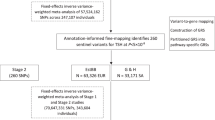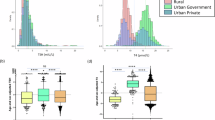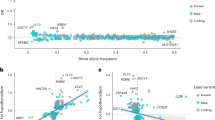Abstract
We have used single-nucleotide polymorphism microarray genotyping and homozygosity-by-descent (HBD) mapping followed by Sanger sequencing or whole-exome sequencing (WES) to identify causative mutations in three consanguineous families with intellectual disability (ID) related to thyroid dyshormonogenesis (TDH). One family was found to have a shared HBD region of 12.1 Mb on 8q24.21-q24.23 containing 36 coding genes, including the thyroglobulin gene, TG. Sanger sequencing of TG identified a homozygous nonsense mutation Arg2336*, which segregated with the phenotype in the family. A second family showed several HBD regions, including 6.0 Mb on 2p25.3-p25.2. WES identified a homozygous nonsense mutation, Glu596*, in the thyroid peroxidase gene, TPO. WES of a mother/father/proband trio from a third family revealed a homozygous missense mutation, Arg412His, in TPO. Mutations in TG and TPO are very rarely associated with ID, mainly because TDH is generally detectable and treatable. However, in populations where resources for screening and detection are limited, and especially where consanguineous marriages are common, mutations in genes involved in thyroid function may also be causes of ID, and as TPO and TG mutations are the most common genetic causes of TDH, these are also likely to be relatively common causes of ID.
Similar content being viewed by others
Log in or create a free account to read this content
Gain free access to this article, as well as selected content from this journal and more on nature.com
or
References
Loeber, J. G. Neonatal screening in Europe; the situation in 2004. J. Inherit. Metab. Dis. 30, 430–438 (2007).
Toublanc, J.-E. Comparison of epidemiological data on congenital hypothyroidism in Europe with those of other parts in the world. Horm. Res. 38, 230–235 (1992).
Bongers-Schokking, J. J., Koot, H. M., Wiersma, D., Verkerk, P. H. & de Muinck Keizer-Schrama, S. M. Influence of timing and dose of thyroid hormone replacement on development in infants with congenital hypothyroidism. J. Pediatr 136, 292–297 (2000).
Delange, F. Neonatal screening for congenital hypothyroidism results and perspectives. Horm. Res. 48, 51–61 (1997).
Cangul, H., Aycan, Z., Olivera-Nappa, A., Saglam, H., Schoenmakers, N. A., Boelaert, K. et al. Thyroid dyshormonogenesis is mainly caused by TPO mutations in consanguineous community. Clin. Endocrinol. 79, 275–281 (2013).
Park, S. M. & Chatterjee, V. K. K. Genetics of congenital hypothyroidism. J. Med. Genet. 42, 379–389 (2005).
Therrell, B. L., Padilla, C. D., Loeber, J. G., Kneisser, I., Saadallah, A., Borrajo, G. J. C. et al. Current status of newborn screening worldwide. Semin. Perinatol. 39, 171–187 (2015).
Rafiq, M. A., Ansar, M., Marshall, C. R., Noor, A., Shaheen, N., Mowjoodi, A. et al. Mapping of three novel loci for non-syndromic autosomal recessive mental retardation (NS-ARMR) in consanguineous families from Pakistan. Clin. Genet. 78, 478–483 (2010).
Lahiri, D. K. & Nurnberger, J. I. Jr . A rapid non-enzymatic method for the preparation of HMW DNA from blood for RFLP studies. Nucleic Acids Res. 19, 5444 (1991).
Lin, M., Wei, L.-J., Sellers, W. R., Lieberfarb, M., Wong, W. H. & Li, C. dChipSNP: significance curve and clustering of SNP-array-based loss-of-heterozygosity data. Bioinformatics 20, 1233–1240 (2004).
Seelow, D., Schuelke, M., Hildebrandt, F. & Nürnberg, P. HomozygosityMapper–an interactive approach to homozygosity mapping. Nucleic Acids Res. 37, W593–W599 (2009).
Gazal, S., Sahbatou, M., Babron, M.-C., Génin, E. & Leutenegger, A.-L. FSuite: exploiting inbreeding in dense SNP chip and exome data. Bioinformatics 30, 1940–1941 (2014).
Mir, A., Sritharan, K., Mittal, K., Vasli, N., Araujo, C., Jamil, T. et al. Truncation of the E3 ubiquitin ligase component FBXO31 causes non-syndromic autosomal recessive intellectual disability in a Pakistani family. Hum. Genet. 133, 975–984 (2014).
Rafiullah, R., Aslamkhan, M., Paramasivam, N., Thiel, C., Mustafa, G., Wiemann, S. et al. Homozygous missense mutation in the LMAN2L gene segregates with intellectual disability in a large consanguineous Pakistani family. J. Med. Genet. 53, 138–144 (2016).
Machiavelli, G. A., Caputo, M., Rivolta, C. M., Olcese, M. C., Gruñeiro-Papendieck, L., Chiesa, A. et al. Molecular analysis of congenital goitres with hypothyroidism caused by defective thyroglobulin synthesis. Identification of a novel c.7006C>T [p.R2317X] mutation and expression of minigenes containing nonsense mutations in exon 7. Clin. Endocrinol. (Oxf.) 72, 112–121 (2010).
Abecasis, G. R., Auton, A., Brooks, L. D., DePristo, M. A., Durbin, R. M., Handsaker, R. E. et al. An integrated map of genetic variation from 1,092 human genomes. Nature 491, 56–65 (2012).
Carrasco, N. Iodide transport in the thyroid gland. Biochim. Biophys. Acta 1154, 65–82 (1993).
Targovnik, H. M. in Werner and Ingbar’s The Thyroid: A Fundamental and Clinical Text, 10th edn (eds Braverman, L. E. & Cooper, D. S.) 74–92 (Lippincott Williams and Wilkins, Philadelphia, PA, USA, 2013).
Kopp, P. in Werner and Ingbar’s The Thyroid: A Fundamental and Clinical Text, 10th edn (eds Braverman, L. E. & Cooper, D. S.) 48–73 (Lippincott Williams and Wilkins, Philadelphia, PA, USA, 2013).
Vulsma, T. & De Vijlder, J. J. M. in Werner and Ingbar’s The Thyroid: A Fundamental and Clinical Text, 10th edn (eds Braverman, L. E. & Cooper, D. S.) 535–551 (Lippincott Williams and Wilkins, Philadelphia, PA, USA, 2013).
Van Vliet, G. & Deladoey, J. in Werner and Ingbar’s The Thyroid: A Fundamental and Clinical Text 10th edn (eds Braverman, L. E. & Cooper, D. S.) 787–789 (Lippincott Williams and Wilkins, Philadelphia, PA, USA, 2013).
Iqbal, Z., Neveling, K., Razzaq, A., Shahzad, M., Zahoor, M. Y., Qasim, M., et al. Targeted next generation sequencing reveals a novel intragenic deletion of the TPO gene in a family with intellectual disability. Arch. Med. Res 43, 312–316 (2012).
Acknowledgements
We thank the study participants and their families for their invaluable contributions to this study. This study was supported by a grant from the Canadian Institutes of Health Research to JBV (no. MOP-102758) and also by the Medical Faculty of the University Heidelberg. RR was supported by a scholarship from the German Academic Exchange Service (DAAD).
Author information
Authors and Affiliations
Corresponding authors
Ethics declarations
Competing interests
The authors declare no conflict of interest.
Additional information
Supplementary Information accompanies the paper on Journal of Human Genetics website
Supplementary information
Rights and permissions
About this article
Cite this article
Mittal, K., Rafiq, M., Rafiullah, R. et al. Mutations in the genes for thyroglobulin and thyroid peroxidase cause thyroid dyshormonogenesis and autosomal-recessive intellectual disability. J Hum Genet 61, 867–872 (2016). https://doi.org/10.1038/jhg.2016.62
Received:
Revised:
Accepted:
Published:
Issue date:
DOI: https://doi.org/10.1038/jhg.2016.62
This article is cited by
-
Novel homozygous variant in the TPO gene associated with congenital hypothyroidism and mild-intellectual disability
Human Genome Variation (2020)



